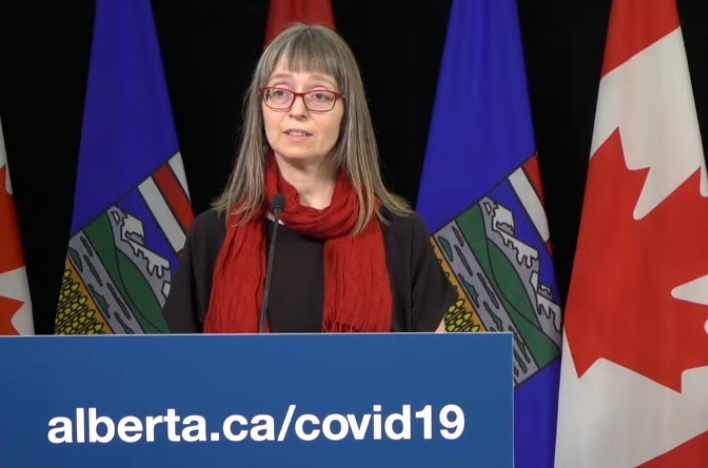ALBERTA – Cancelling all summer events that involve mass gatherings will be critical in controlling the spread of the COVID-19 virus.
It was not an easy decision to cancel all summer events in the province, Alberta’s Chief Medical Officer of Health Dr. Deena Hinshaw said at a press conference Friday (April 24), but the decision will be critical in keeping Albertans safe.
“I am convinced this measure is necessary – COVID-19 is still with us and it spreads rapidly through social interactions,” Hinshaw said.
“The kinds of social gatherings we are used to, even in the summer, can result in significant spread of the virus from just one person, who may not even know they are infected. The results can be explosive, far-reaching and deadly.”
There have been 297 new cases of COVID-19 confirmed in Alberta, bringing the provincial total to 4,017. Three of these new cases include members of a First Nation community in the Calgary zone.
A total of 1,397 Albertans have recovered from the virus. There have been five additional COVID-19 related deaths bringing the provincial total to 72.
There have been 16 cases of the virus confirmed in the MD of Bighorn and Canmore region, with all but two recovered. There have been four confirmed cases in Banff National Park, with two recovered. There have been 33 cases of COVID-19 reported in Rocky View Country and 15 cases of the virus reported in the Cochrane-Springbank region.
The number of COVID-19 cases and hospitalizations in the province has been lower than the model predicted by AHS, Hinshaw said, but it is critical to understand the virus will be in the province for many months to come.
“The relatively low case numbers we are seeing in most of the province are the result of our collective efforts and sacrifices,” Hinshaw said.
She added the virus is challenging to control because transmission can be possible before symptoms, including cough, runny nose, sore throat, fever and shortness of breath, are present.
This challenge makes it imperative for people to be mindful of their actions, Hinshaw said, and ensure they are following public health measures and protocols.
Public health is beginning to map out the ripple effects of gatherings that occurred early in the outbreak, Hinshaw said, to better understand the reality of transmission prior to the onset of symptoms in an individual.
“The numbers [of COVID-19 cases] rising should be a cautionary tale not a tale of futility and we have control over this,” Hinshaw said.
“By our actions, we have done incredible things and the numbers to date have shown that we have the power to contain this and control the spread together.”
Hinshaw said the case numbers in the province are largely rising due to increased testing, paired with a number of outbreaks in Alberta including the Cargill meat processing plant in High River, JBS Foods in Brooks and the Kearl Lake work camp.
Another potential site of concern has been identified at the Mountain View Poultry chicken processing facility in Okotoks. Hinshaw said two cases have been identified and supports have been put in place to help prevent the spread of the virus in the facility.
Those who have tested positive for the virus have been put into self-isolation.
Hinshaw said the province has learned from the response to Cargill. She said public health officials need to look at the overall life of those infected to trace all potential places the virus could have been transmitted.
“We can’t focus on the plant in isolation, we need to look at the whole picture and support people in every single setting of their lives,” Hinshaw said.
The province is working on a guidance document to help operators of these kinds of facilities so additional measures can be implemented proactively. The information is expected to be available by next week.
A general non-health care facility guideline is available for essential service spaces, Hinshaw said, but the outbreaks have made it clear additional supports are necessary.
“We know that this is an urgent situation,” Hinshaw said.
Follow RMOToday.com's COVID-19 special section for the latest local and national news on the coronavirus pandemic, as well as resources, FAQs and more.




